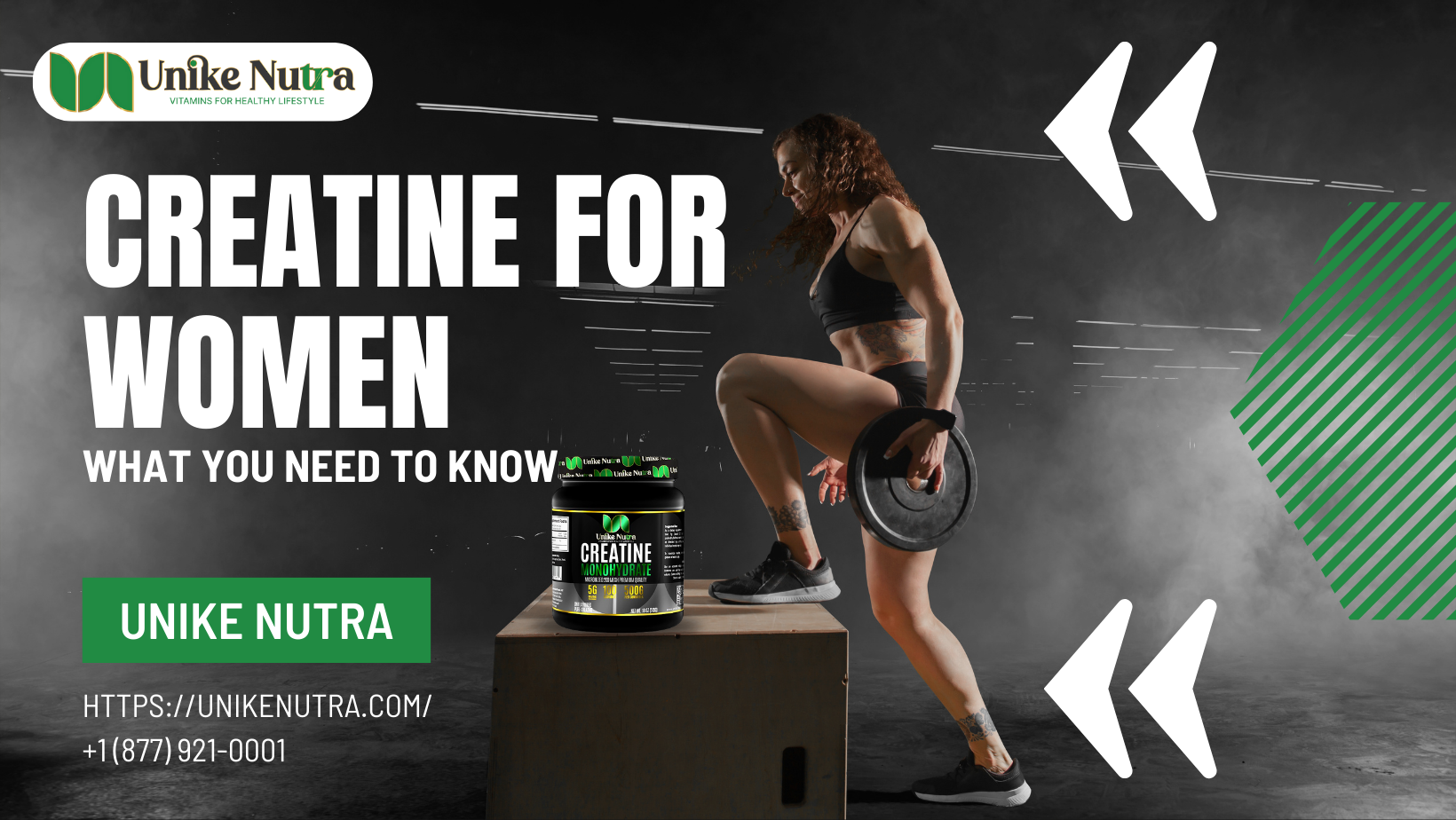Creatine is a naturally occurring substance found in the body, primarily in muscles. It plays a crucial role in energy production, particularly during short bursts of high-intensity exercise. While often associated with male athletes, creatine offers numerous benefits for women as well. Here are 10 key points to understand about creatine and its potential impact on your health and fitness:
What is Creatine?
As mentioned, creatine is a natural compound found in muscle cells and aids in energy production. It helps your body convert adenosine triphosphate (ATP) into adenosine diphosphate (ADP), the primary fuel source for muscles during short, intense activities.
Benefits for Women:
Creatine can enhance various aspects of women’s health and fitness. It can:
Improve strength and power:
Studies show creatine supplementation combined with resistance training can lead to increased muscle strength and power output in women.
Boost exercise performance:
Creatine can help you push harder and perform better during high-intensity workouts, like weightlifting, sprinting, or HIIT (High-Intensity Interval Training).
Aid muscle recovery:
Creatine may help reduce muscle soreness and fatigue after exercise, allowing you to recover faster and return to training sooner.
Support bone health:
Research suggests creatine supplementation might benefit bone health in post-menopausal women by increasing bone mineral density.
Enhance cognitive function:
Studies indicate creatine may improve cognitive function and memory, potentially benefiting brain health in women.
Dosage and Safety:
The recommended daily creatine dosage for women is typically 3-5 grams. Consulting a healthcare professional before starting any new supplement, including creatine, is crucial to ensure it’s safe and appropriate for your individual needs.
Types of Creatine:
Several creatine supplements are available, with creatine monohydrate being the most studied and widely used form. Other forms exist, but their effectiveness and safety might vary.
Side Effects:
Creatine is generally well-tolerated, but mild side effects like stomach upset and cramping can occur in some individuals. It’s important to stay adequately hydrated while taking creatine.
Not a Magic Bullet:
While creatine offers benefits, it’s not a miracle worker. It works best when combined with a healthy diet, regular exercise, and adequate rest.
Creatine and Weight Gain:
Creatine itself does not directly cause weight gain. However, it can lead to a slight increase in water weight in the muscles initially. Additionally, the increased muscle mass gained through exercise with creatine supplementation might contribute to weight gain, but this is muscle, not fat.
Creatine and Hormones:
There’s no conclusive evidence that creatine significantly impacts female hormone levels. However, some research suggests it might slightly elevate estrogen levels, potentially benefiting menstrual regularity.
Ethical Considerations:
When choosing a creatine supplement, consider its source and production practices. Opting for ethically sourced and cruelty-free options aligns with responsible supplement consumption.
Consult a Healthcare Professional:
As with any new supplement, discuss creatine with your doctor or a registered dietitian to determine if it’s suitable for you and fits your individual health goals.
Creatine, often thought of as a bodybuilding supplement for men, holds immense benefits for women as well. Here’s a deep dive into creatine for women, busting myths and highlighting its potential:
Creatine fuels short bursts of energy, crucial for weightlifting and HIIT workouts. It helps build lean muscle mass, leading to a stronger, more toned physique.
-
Improved Performance:
Creatine enhances your ability to perform at peak intensity. Whether you’re a sprinter, a CrossFit enthusiast, or simply pushing yourself in the gym, creatine can elevate your workout game.
-
Faster Recovery:
By replenishing ATP (the body’s energy currency), creatine reduces muscle fatigue and soreness, allowing you to recover quicker and get back to training sooner.
Contrary to popular belief, creatine won’t make you bulky. Women naturally have lower levels of testosterone, the hormone responsible for extreme muscle growth. Creatine primarily promotes lean muscle development.
-
Weight Management:
Building muscle mass increases your metabolic rate, helping you burn more calories at rest. This can contribute to weight management goals when combined with proper diet and exercise.
Studies suggest creatine may improve cognitive function and memory, especially for vegetarians and vegans who might have lower natural creatine stores.
Creatine supplementation might help alleviate symptoms of premenstrual syndrome (PMS) by regulating mood swings and improving energy levels.
-
Bone Health:
Creatine may play a role in bone health and injury prevention, particularly beneficial for women as they age and become more susceptible to osteoporosis.
Creatine is one of the most researched and well-tolerated supplements available. When used appropriately, it’s safe for most healthy women.
-
Consult a Doctor:
While generally safe, it’s always recommended to consult your doctor before starting any new supplement, especially if you have any underlying health conditions.
Creatine for women can be a powerful tool to enhance your fitness journey. By understanding its benefits and proper usage, you can unlock a new level of performance and well-being.
By understanding these key points, you can make informed decisions about incorporating creatine into your health and fitness routine. Remember, consistency with exercise, a balanced diet, and adequate rest remains paramount for achieving your fitness goals, with creatine potentially serving as a valuable tool to optimize your performance and well-being.


